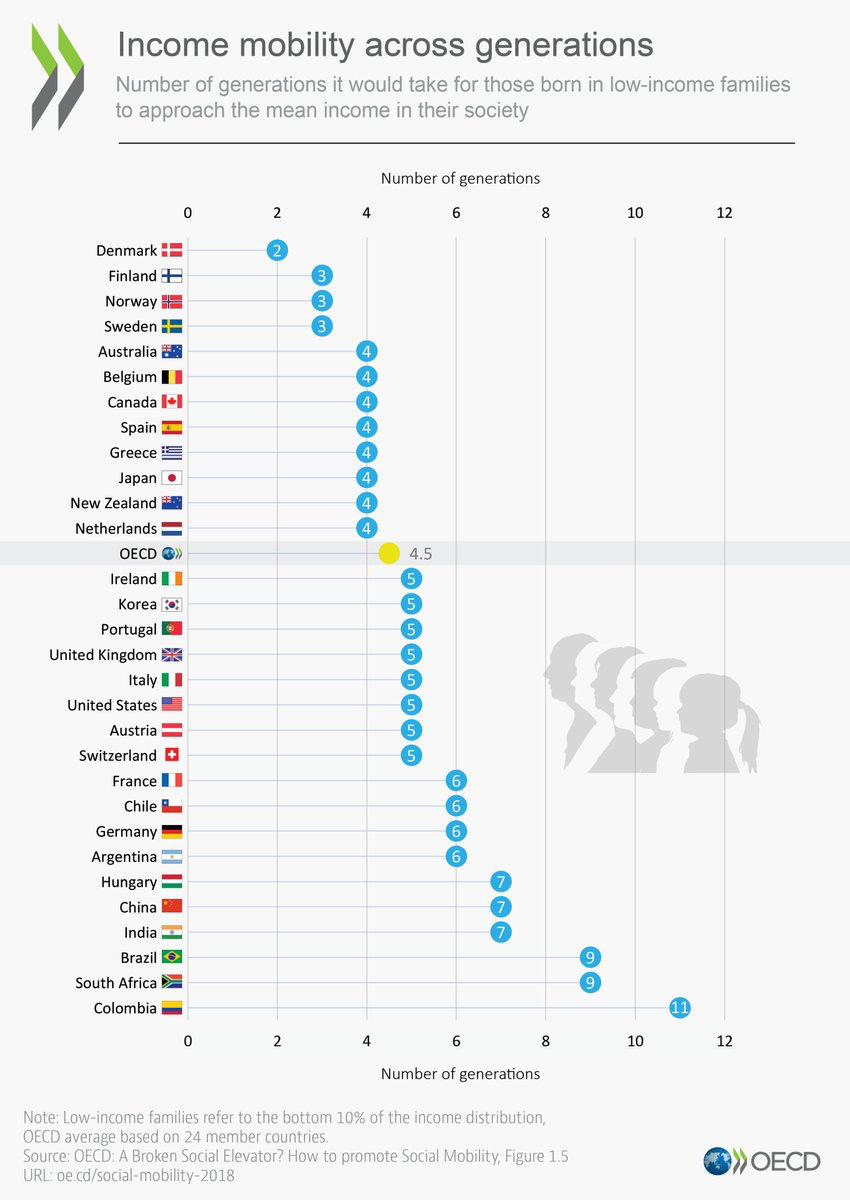- 1 : 2023/04/17(月) 13:37:43.17 ID:OXXUeZ9Cr
-
As income inequality has increased since the 1990s, social mobility has stalled, meaning that fewer people at the bottom have moved up while the richest have largely kept their fortunes. This has severe social, economic and political consequences, according to a new OECD report.
A Broken Social Elevator? How to Promote Social Mobility says that given current levels of inequality and intergenerational earnings mobility, it could take at least five generations or 150 years for the child of a poor family to reach the average income, on average across OECD countries.
This ranges from just two to three generations in the Nordic countries to nine generations or more in some emerging economies. One in three children with a low earning father will also have low earnings, while for most of the other two-thirds upward mobility is limited to the neighbouring earnings group.
“Too many people feel they are being left behind and their children have too few chances to get ahead,” said Gabriela Ramos, OECD Chief of Staff and Sherpa to the G20, who also oversees the OECD's Inclusive Growth Initiative. “We need to ensure that everyone has the opportunity to succeed, especially the most disadvantaged, and that growth becomes truly inclusive.”
Across generations, earnings mobility prospects tend to be weaker in countries where income inequality is high, and stronger in countries where inequality is low. The Nordic countries combine low inequality with high mobility whereas Latin American countries and some emerging economies have high inequality but low mobility.
Income mobility was a reality for many people born between 1955 and 1975 from low-educated parents but it has stagnated for those born after 1975.
Over the four year period observed in this report, about 60% of people remained stuck in the lowest 20% income bracket, while 70% remained at the top. At the same time, one-in-seven of all middle class households, and one-in-five of people living closer to lower incomes, fell into the bottom 20%.
Countries need to put in place policies that give everyone the chance to succeed, says the OECD. Increased investment in education, particularly at an early age, health and family policies would create a more level playing field for disadvantaged children and mitigate the impact of financial hardship on their future.
Access to good quality, affordable housing, as well as transport, and improved urban planning also help reduce regional divides and concentrations of disadvantaged households in cities. Reducing inheritance and gifts tax avoidance, and designing progressive tax systems with adequate rates and reduced exemptions would enhance social mobility. Strengthening safety nets and training schemes, as well as tying social protection entitlements to individuals, not jobs, would help people, especially low earners, cope with losing their job.
https://www.oecd.org/social/action-needed-to-tackle-stalled-social-mobility.htm
- 33 : 2023/04/17(月) 13:38:58.02 ID:DfkeBUim0
-
なんでネトウヨが荒らしてるの?
- 34 : 2023/04/17(月) 13:40:32.29 ID:b3sTREEl0
-
安倍殺し掲示板
- 35 : 2023/04/17(月) 13:41:18.62 ID:OXXUeZ9Cr
- 44 : 2023/04/17(月) 13:44:45.30 ID:BFSGivp/0
-
>>35
トップの国ですら2世代もかかるのか - 36 : 2023/04/17(月) 13:41:54.95 ID:DfkeBUim0
-
北欧はOK、ラテンアメリカはアカンということは書いてあるが日本は?
ソースにないの?(見てないが) - 38 : 2023/04/17(月) 13:42:25.37 ID:2S9cHrX70
-
割りと上位だった
- 39 : 2023/04/17(月) 13:42:30.54 ID:uQ4ojLqtM
-
まあまあいいじゃん
でもインドでも七世代かければいけるもんなのか - 40 : 2023/04/17(月) 13:42:35.14 ID:OPCM+rdCa
-
本文355ページもあるんだが
- 41 : 2023/04/17(月) 13:42:46.54 ID:5h7lj4ST0
-
石油輸出国機構が何いってんだ?
- 42 : 2023/04/17(月) 13:43:06.60 ID:wnwwQtPNM
-
お前ら仕事は?
- 43 : 2023/04/17(月) 13:44:43.17 ID:d5jC4+ucM
-
日本は社長もヒラ社員も平等に貧しいからな
- 45 : 2023/04/17(月) 13:44:56.93 ID:OXXUeZ9Cr
-
This ranges from just two to three generations in the Nordic countries to nine generations or more in some emerging economies. One in three children with a low earning father will also have low earnings, while for most of the other two-thirds upward mobility is limited to the neighbouring earnings group.
Across generations, earnings mobility prospects tend to be weaker in countries where income inequality is high, and stronger in countries where inequality is low. The Nordic countries combine low inequality with high mobility whereas Latin American countries and some emerging economies have high inequality but low mobility.
北欧らしい
OECD「富の再分配がしっかりできてる国教えます。」なんと日本は…
 嫌儲
嫌儲


コメント